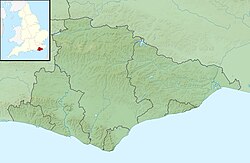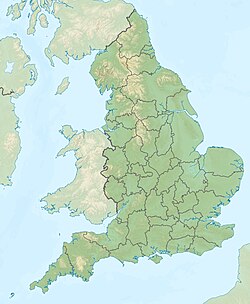Brighton | |
|---|---|
| Coordinates: 50°49′15″N 00°08′15″W / 50.82083°N 0.13750°W | |
| Sovereign state | United Kingdom |
| Constituent country | England |
| Region | South East England |
| Ceremonial county | East Sussex |
| Historic county | Sussex |
| Unitary authority | Brighton and Hove |
| Admin HQ | Hove Town Hall |
| Town charter | 1313 |
| Incorporated | 1854 |
| Unitary authority | 1997 |
| City status | 2000 |
| Government | |
| • Type | Unitary authority |
| • Governing body | Brighton and Hove City Council |
| • Leader | Bella Sankey (Labour) |
| • Mayor | Lizzie Deane |
| • MPs | Chris Ward (Labour, Kemptown and Peacehaven) Siân Berry (Green, Pavilion) |
| Area | |
• Total | 32 sq mi (83 km2) |
| Population (2022) | |
• Total | 277,965 (ranked 59th) (Brighton and Hove pop.) |
| • Density | 8,690/sq mi (3,356/km2) |
| Demonym | Brightonian |
| Time zone | UTC0 (GMT) |
| • Summer (DST) | UTC+1 (BST) |
| Postcode area | |
| Area code | 01273 |
| ISO 3166-2 | GB-BNH |
| ONS code | 00ML (ONS) E06000043 (GSS) |
| OS grid reference | TQ315065 |
| NUTS 3 | UKJ21 |
| Police | Sussex |
| Fire | East Sussex |
| Ambulance | South East Coast |
| Website | www |
Brighton (/ˈbraɪtən/ BRY-tən) is a seaside resort and one of the two main areas of the city of Brighton and Hove in the county of East Sussex, England. It is located 47 miles (76 km) south of London.[1] Archaeological evidence of settlement in the area dates back to the Bronze Age, Roman and Anglo-Saxon periods. The ancient settlement of "Brighthelmstone" was documented in the Domesday Book (1086). The town's importance grew in the Middle Ages as the Old Town developed, but it languished in the early modern period, affected by foreign attacks, storms, a suffering economy and a declining population. Brighton began to attract more visitors following improved road transport to London and becoming a boarding point for boats travelling to France. The town also developed in popularity as a health resort for sea bathing as a purported cure for illnesses.
In the Georgian era, Brighton developed as a highly fashionable seaside resort, encouraged by the patronage of the Prince Regent, later King George IV, who spent much time in the town and constructed the Royal Pavilion in the Regency era. Brighton continued to grow as a major centre of tourism following the arrival of the railways in 1841, becoming a popular destination for day-trippers from London. Many of the major attractions were built in the Victorian era, including the Grand Hotel, the Hilton Brighton Metropole, the Palace Pier and the West Pier. The town continued to grow into the 20th century, expanding to incorporate more areas into the town's boundaries before joining Hove to form the unitary authority of Brighton and Hove in 1997, which was granted city status in 2000.[2] Today, Brighton and Hove district has a resident population of about 277,965 and the wider Brighton and Hove conurbation has a population of 474,485 (2011 census).[note 1]
Brighton's location has made it a popular destination for tourists, renowned for its diverse communities, shopping areas, large and vibrant cultural, music and arts scene, and its large LGBT population, leading to its recognition as the "unofficial gay capital of the UK" and as of the 2021 census, 10.7% of the population of Brighton and Hove over the age of 18 identify as gay, lesbian or bisexual, the highest percentage in the entire UK.[3] Brighton has been called the UK's "hippest city"[4] and "the happiest place to live in the UK".[5]
- ^ OS Explorer map 122: Brighton and Hove. Scale: 1:25 000. Publisher:Ordnance Survey – Southampton B2 edition. Publishing date: 2009. ISBN 978-0319240816
- ^ "City Deal; The beginning of a great city region". Brighton and Hove City Council. Archived from the original on 6 January 2016. Retrieved 14 September 2015.
- ^ Cite error: The named reference
metro.co.ukwas invoked but never defined (see the help page). - ^ Petridis, Alexis (19 May 2010). "Is Brighton Britain's hippest city?". The Guardian. Archived from the original on 11 July 2015. Retrieved 10 August 2015.
- ^ "Brighton: 'The Happiest Place In The UK'". Sky News. Archived from the original on 11 July 2015. Retrieved 10 August 2015.
Cite error: There are <ref group=note> tags on this page, but the references will not show without a {{reflist|group=note}} template (see the help page).










